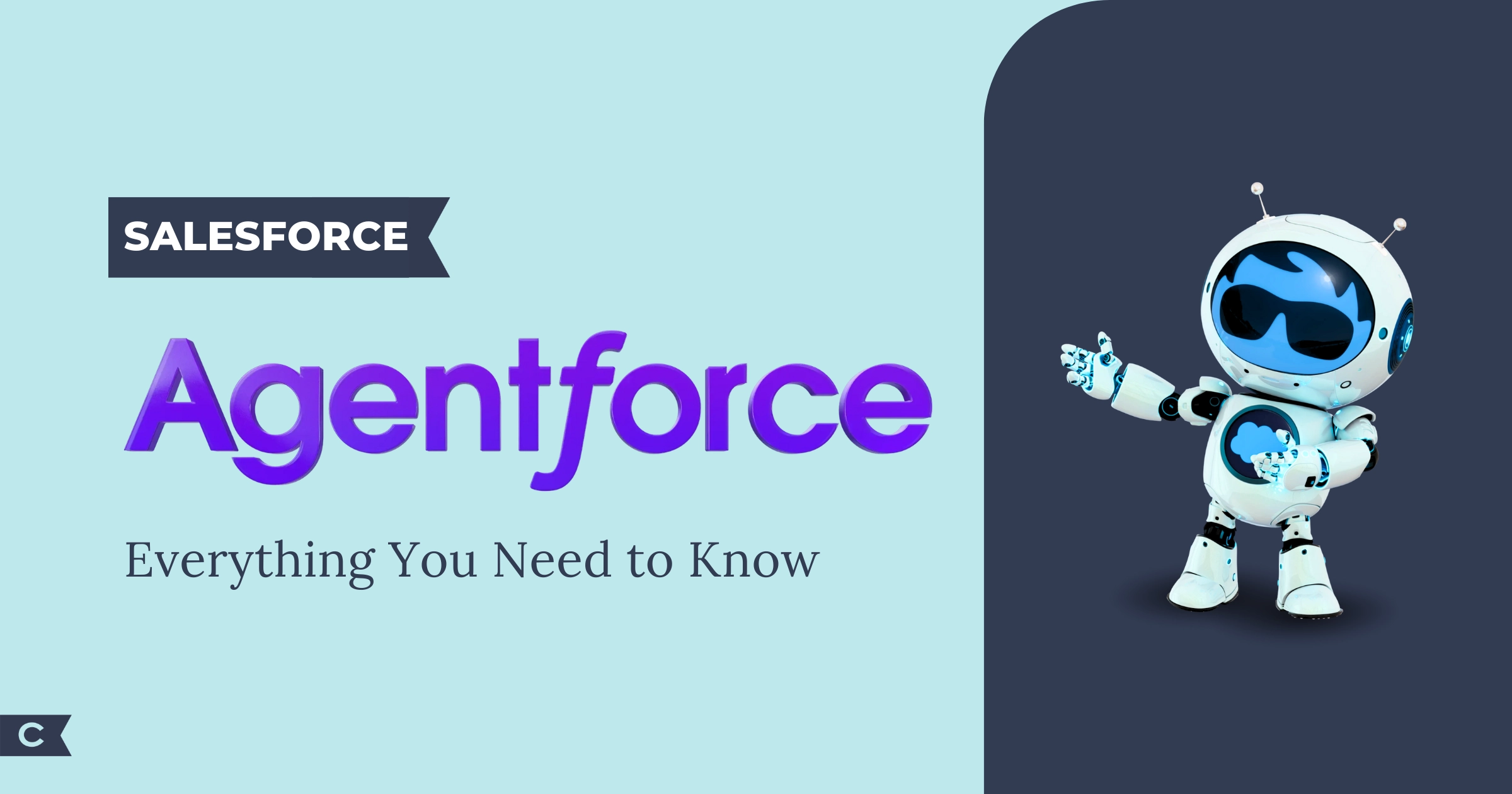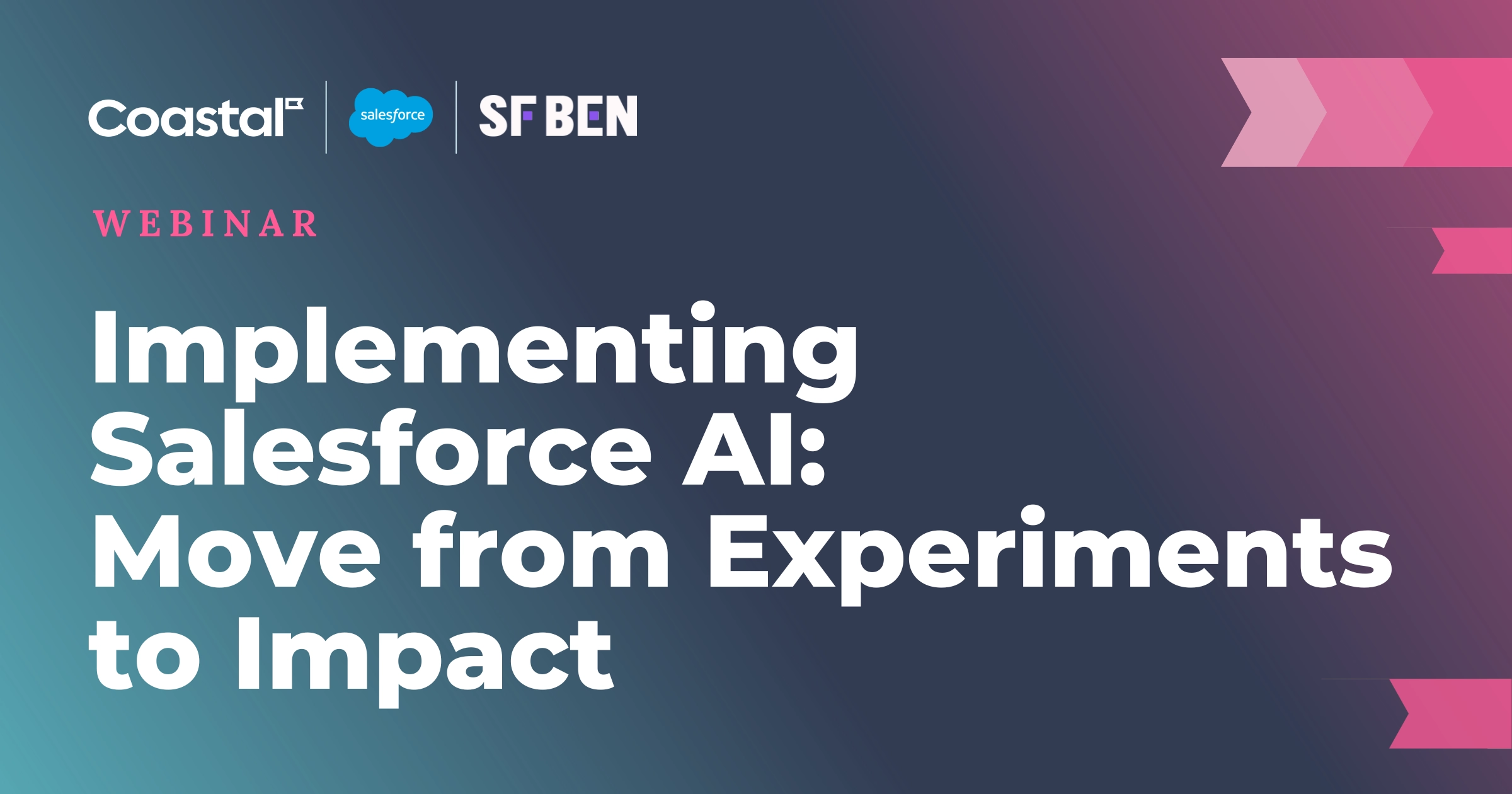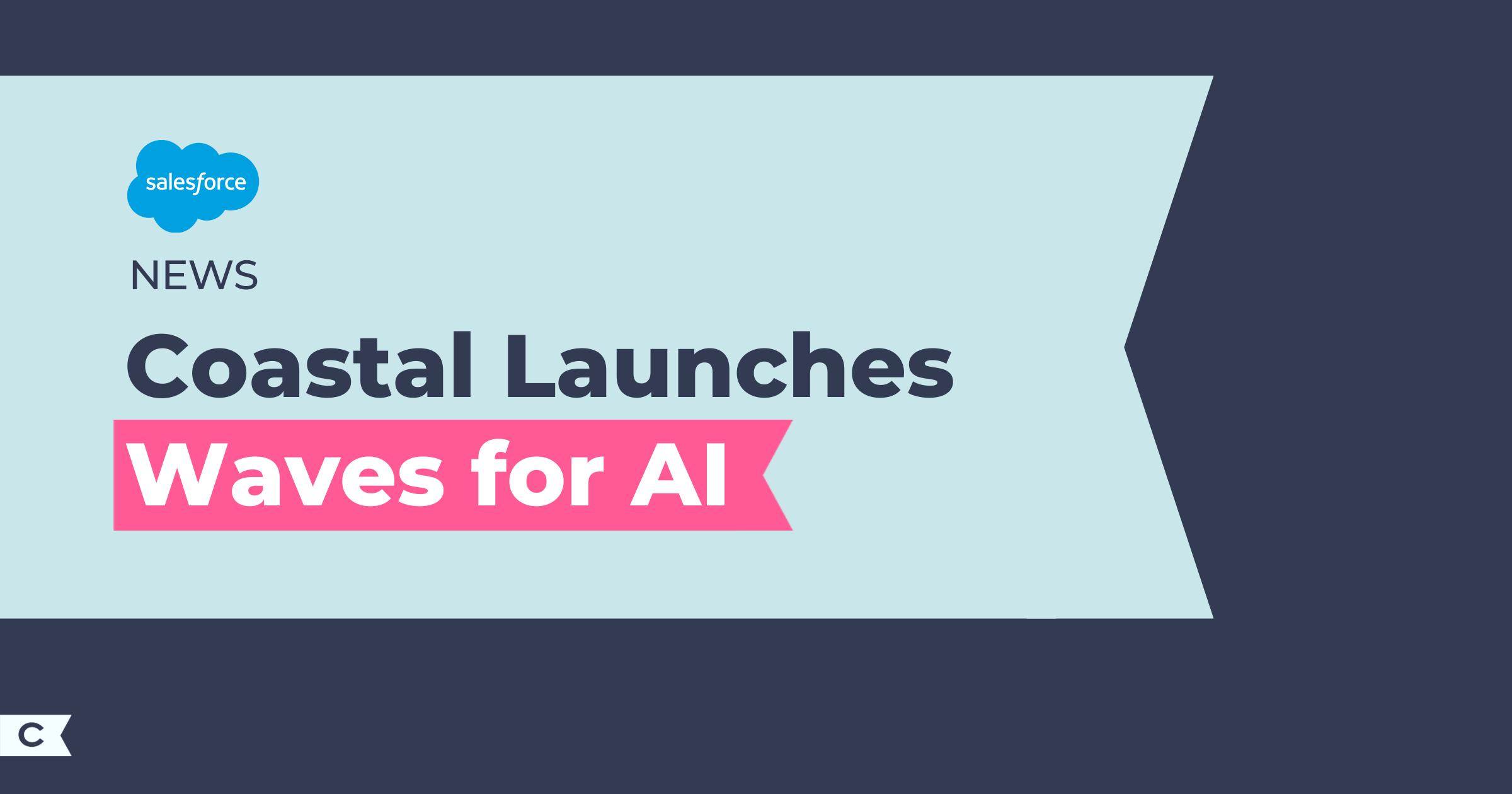Salesforce’s Agentforce is making AI a practical tool for business by going beyond simple assistance to taking meaningful actions. Announced ahead of Dreamforce, Agentforce is designed to help teams get more done by leveraging AI as an active participant in everyday processes.
Sam Taylor, Coastal’s Director of Innovation, was invited to an exclusive Agentforce workshop before Dreamforce. He spent the day exploring how Agentforce simplifies customer interactions with autonomous agents. This early, hands-on experience gave us unique insight into Agentforce’s potential and how it can transform business operations.
In this FAQ, we’re breaking down everything you need to know about Agentforce—how it works, what sets it apart, and how it can enhance customer engagement and productivity for your business.
What is Agentforce?
Agentforce is Salesforce’s approach to putting AI to work in a more meaningful way. It goes beyond just answering questions or helping in a chat—it’s about AI taking action on your behalf, both inside and outside your organization. This type of AI, known as “agentic” AI, acts like an extension of your team.
Agentforce is integrated directly into Salesforce’s familiar interface, making it easy to configure. Think of these agents as extra hands that help you do more and do it faster.
Types of AI agents with Agentforce
- Autonomous agents: “Complete a job for me.”
- Assistive agents: “Help me complete a job.”
Salesforce offers agents that can help with various tasks across Customer 360—like building pipeline, handling customer cases, and coaching sales teams. You can also create and customize agents to fit your specific needs.
Why should I care about Agentforce?
Agentforce goes beyond just assisting—it can take on the repetitive, low-intensity tasks that often slow your team down. It handles things like scheduling meetings, opening service cases, and processing returns, giving your team more time to focus on the work that really matters and improving customer experiences along the way.
How is Agentforce different from traditional chatbots?
Agentforce is a major step up from traditional chatbots that follow rigid if/then rules. It doesn’t rely on pre-set scripts. Instead, it’s designed to make decisions and act dynamically. While it can still serve as a chatbot, Agentforce offers far more depth and capability.
What are Coastal’s impressions of Agentforce? Does it work?
As an early partner for Agentforce, Coastal had the opportunity to test the platform before its official launch. Right now, it’s focused on chat, and we’ve seen great potential—from helping sales teams schedule meetings to handling service tasks like returns and case creation.
What skills do I need to get started with Agentforce?
While Salesforce is taking a lot of the heavy developer lift out of getting started with agentic AI, there are still some core concepts that your implementation team will need to understand, including:
- Prompt engineering: Agentforce decides what to do based on natural language prompts, just like you’re used to with ChatGPT and other services. Crafting effective prompts is crucial to getting the AI to respond in the required manner and will vary based on the context, the models used, and your ability to test different scenarios.
- Language model selection: Salesforce gives you some off-the-shelf “foundational” models to start with, but not only can you make adjustments to them in Einstein Studio, they’re also continuing to add more. This means knowing the appropriate model configuration for a particular prompt will be essential for accuracy and efficiency.
- RAG (Retrieval-Augmented Generation): Off-the-shelf LLMs are smart, but they don’t know your business the way you do. You can spend large amounts of money and time training new models, or you can augment them based on your documented processes and knowledge. That’s where RAG comes into play, using Data Cloud’s vector database capability. You can consume what’s considered “unstructured data” (such as standard operating procedure, product specifications, or installation instructions) in a way that makes it easy for the AI to search and give the right answer to the user.
How much will Agentforce cost?
Salesforce has indicated that Agentforce pricing will start at $2 per conversation, but there are a few unknowns we’re still monitoring:
- Salesforce indicated in its press release that “standard volume discounts apply.” There’s no indication what the pricing curve looks like, so that’s something that we’ll probably observe on a case-by-case basis.
- Generative AI, at scale, is usually billed based on the number of “tokens” processed. Salesforce’s existing Einstein generative AI offerings are also billed based on the number and size of prompts. The “per conversation” pricing may be an opportunity to simplify this pricing by averaging out how complex the average conversation is to give customers an easier idea of what their billing will be like. Whether the end result is purely per conversation or per token usage is to be seen.
- This is a nascent industry, and pricing models will likely change over time. For example, we are starting to see some companies offer outcome-based pricing, where the customer is only charged for using AI if the AI agent can independently resolve a customer service request.
What does the future of Agentforce look like?
Salesforce’s recent acquisition of Tenyx, a voice AI startup, and their demo of a voice agent at Dreamforce point to voice agent capabilities coming by 2025. This will further expand what Agentforce can do.
It’s also important to note that Agentforce’s capabilities differ from generative AI used for Salesforce administration.
How does Agentforce fit with Einstein, Data Cloud, and OpenAI?
Agentforce is part of Salesforce’s larger AI ecosystem and complements tools like:
- Einstein: Einstein is Salesforce’s broad branding for AI and AI-adjacent capabilities. This includes both predictive AI features (such as Lead Scoring or Send Time Optimization) and Einstein Generative AI.
- Data Cloud: Data Cloud can be used by generative AI to access data and knowledge at scale, even if it’s originating from other business platforms. It also allows for more innovative ways to search data, such as vector databases, without requiring AI engineers.
- OpenAI & custom models: Salesforce has first partnered with OpenAI to allow the use of its top models with generative AI with no experience required as part of its Trust Layer. Salesforce is expanding these partnerships to Anthropic and others, and also allows you to bring your own fine-tuned models if you so choose.
Next Steps
Complimentary AI workshop to align Agentforce with your business strategy for real results.
Kickstart your AI journey with a workshop that sets the stage for measurable impact. Coastal’s AI-certified experts will help you understand exactly how Agentforce can fit into your strategy and deliver ROAI.
Here’s what’s in store:
- Map Your AI Priorities to Goals: Together, we’ll identify how Agentforce can achieve your business objectives and create a prioritized, actionable roadmap.
- Unpack Salesforce’s AI Power: Get a clear, no-nonsense view of Agentforce features, licensing options, and real-world applications (including how it differs from Einstein and other Salesforce products)—so you’re set to make smart decisions from the start.
- Validate Your AI Impact: Identify top use cases to drive value and streamline workflows.
- Takeaway Essentials: Walk away with practical insights, a session recording, and our full presentation for easy reference.
Agentforce is changing the future of business—let Coastal show you how to make it a purposeful, strategic part of yours.
Schedule Your Agentforce Workshop
Fill out the form, and we’ll reach out to schedule a time. Complimentary workshops are available for qualified users, with pre-qualification required.






